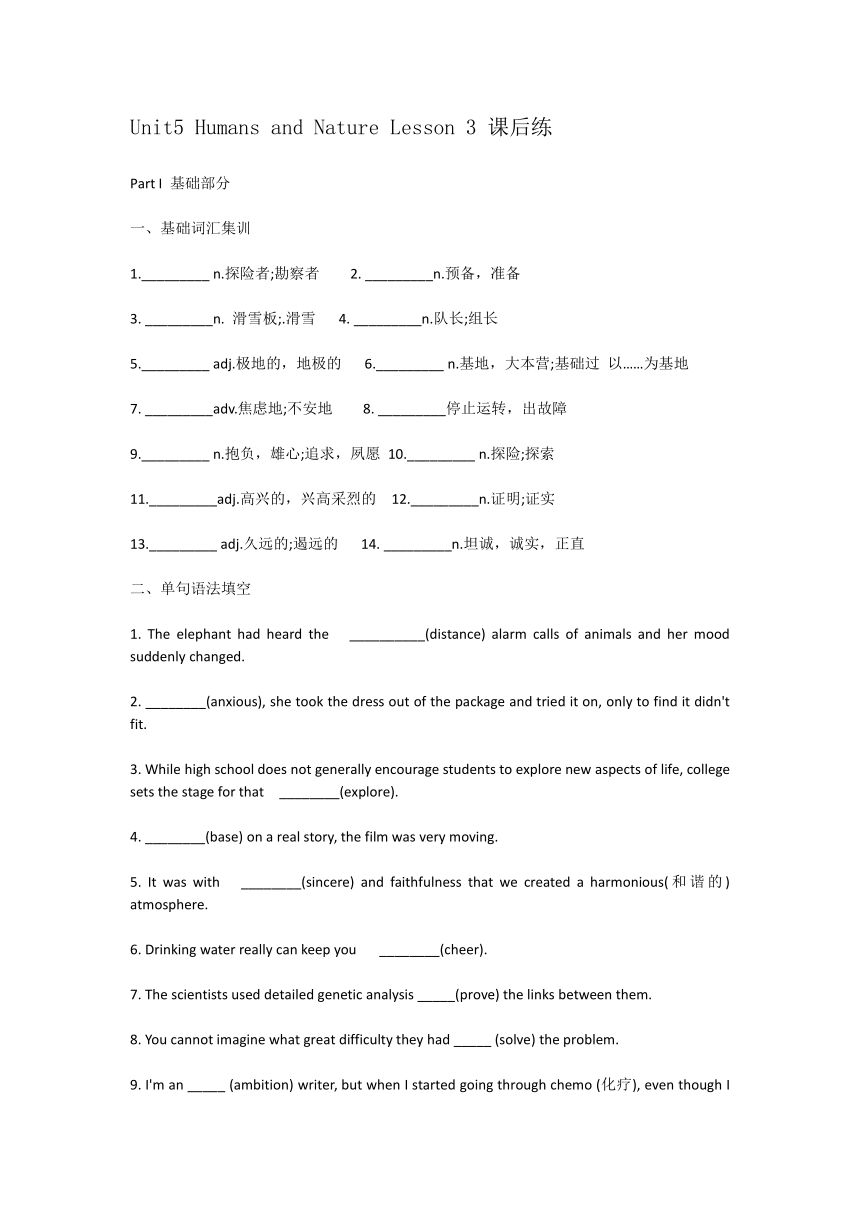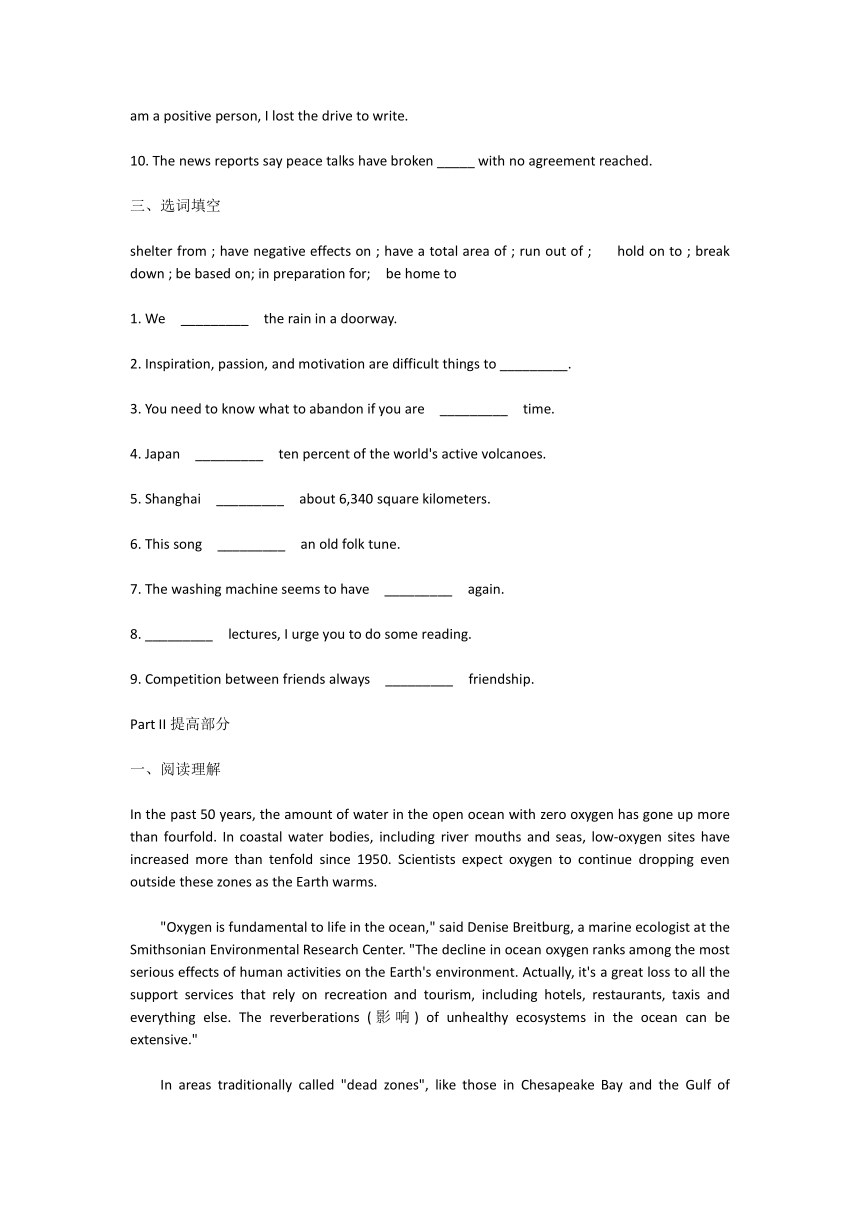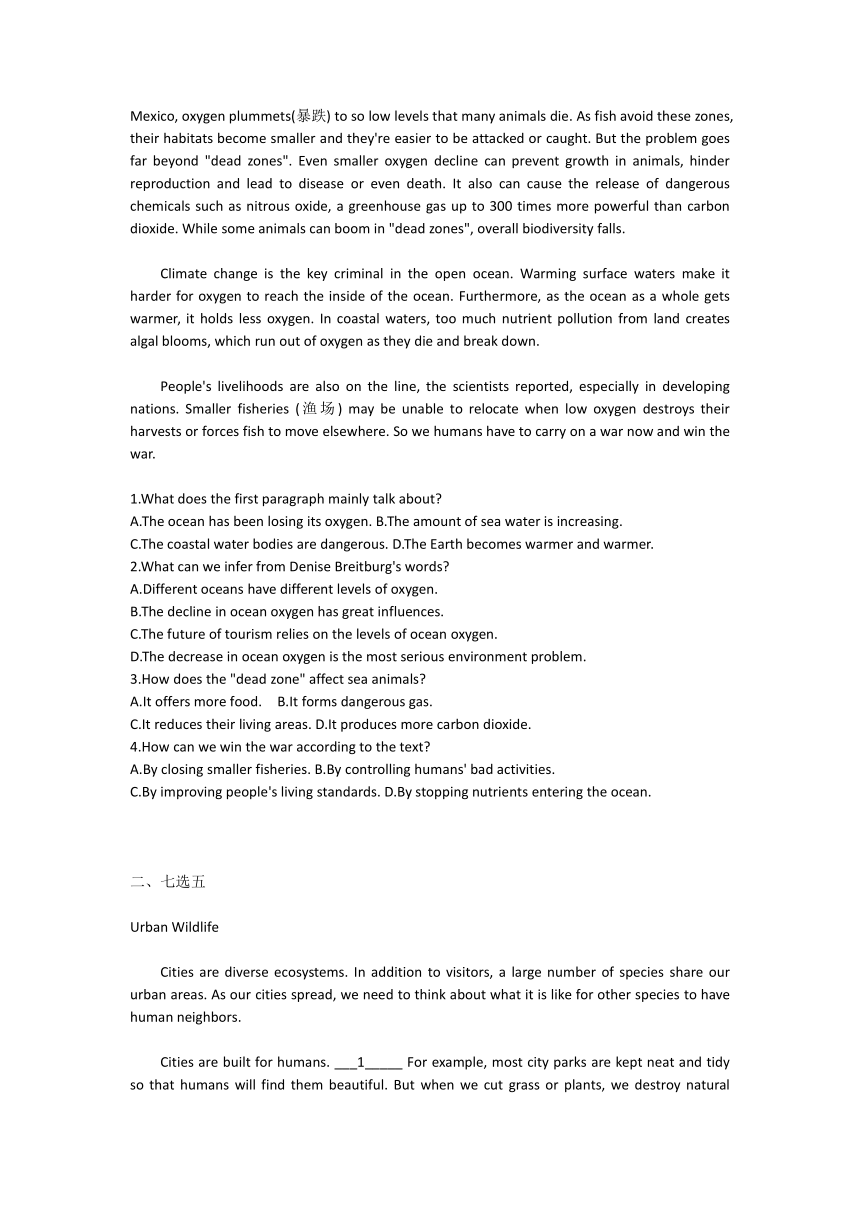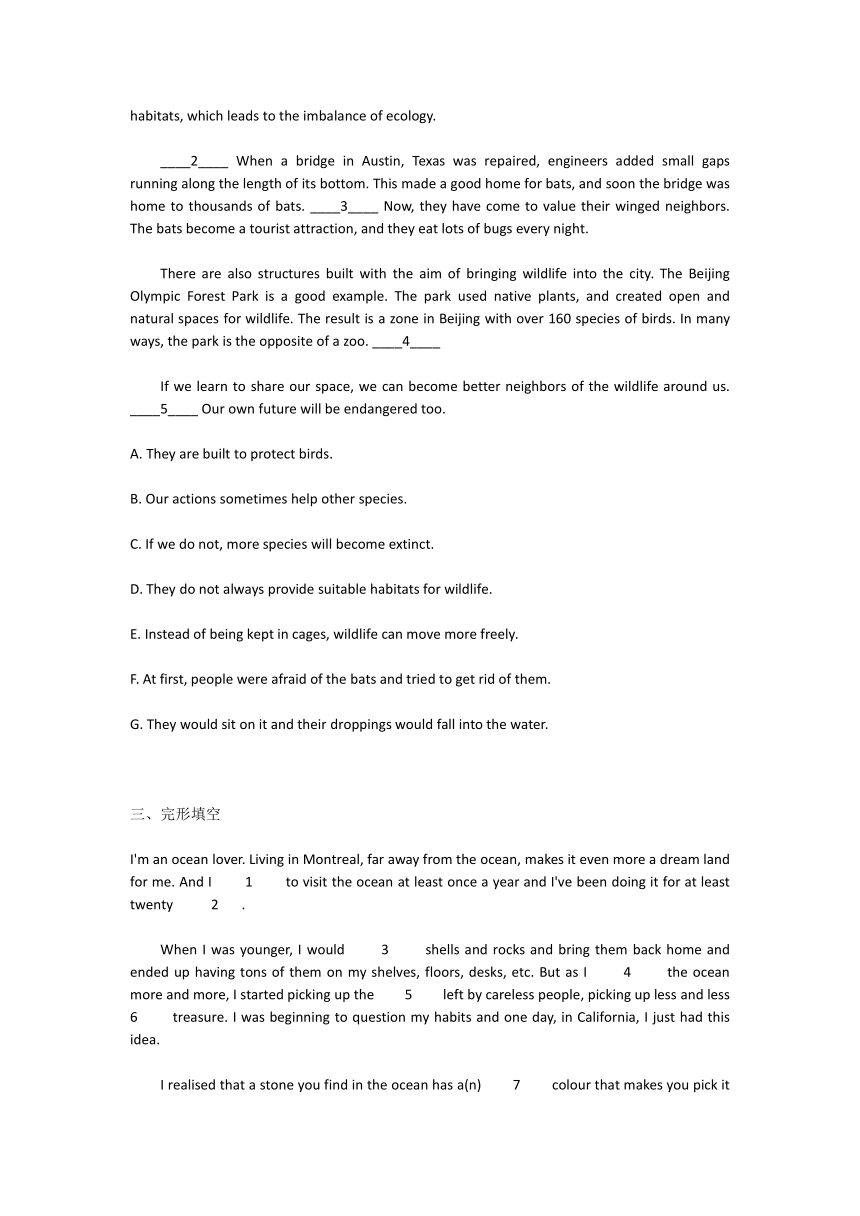北师大版(2019)必修二Unit5 Humans and Nature Lesson 3 课后练(Word版含答案)
文档属性
| 名称 | 北师大版(2019)必修二Unit5 Humans and Nature Lesson 3 课后练(Word版含答案) |  | |
| 格式 | zip | ||
| 文件大小 | 16.8KB | ||
| 资源类型 | 教案 | ||
| 版本资源 | 北师大版(2019) | ||
| 科目 | 英语 | ||
| 更新时间 | 2022-12-18 22:18:41 | ||
图片预览




文档简介
Unit5 Humans and Nature Lesson 3 课后练
Part I 基础部分
一、基础词汇集训
1._________ n.探险者;勘察者 2. _________n.预备,准备
3. _________n. 滑雪板;.滑雪 4. _________n.队长;组长
5._________ adj.极地的,地极的 6._________ n.基地,大本营;基础过 以……为基地
7. _________adv.焦虑地;不安地 8. _________停止运转,出故障
9._________ n.抱负,雄心;追求,夙愿 10._________ n.探险;探索
11._________adj.高兴的,兴高采烈的 12._________n.证明;证实
13._________ adj.久远的;遏远的 14. _________n.坦诚,诚实,正直
二、单句语法填空
1. The elephant had heard the __________(distance) alarm calls of animals and her mood suddenly changed.
2. ________(anxious), she took the dress out of the package and tried it on, only to find it didn't fit.
3. While high school does not generally encourage students to explore new aspects of life, college sets the stage for that ________(explore).
4. ________(base) on a real story, the film was very moving.
5. It was with ________(sincere) and faithfulness that we created a harmonious(和谐的) atmosphere.
6. Drinking water really can keep you ________(cheer).
7. The scientists used detailed genetic analysis _____(prove) the links between them.
8. You cannot imagine what great difficulty they had _____ (solve) the problem.
9. I'm an _____ (ambition) writer, but when I started going through chemo (化疗), even though I am a positive person, I lost the drive to write.
10. The news reports say peace talks have broken _____ with no agreement reached.
三、选词填空
shelter from ; have negative effects on ; have a total area of ; run out of ; hold on to ; break down ; be based on; in preparation for; be home to
1. We _________ the rain in a doorway.
2. Inspiration, passion, and motivation are difficult things to _________.
3. You need to know what to abandon if you are _________ time.
4. Japan _________ ten percent of the world's active volcanoes.
5. Shanghai _________ about 6,340 square kilometers.
6. This song _________ an old folk tune.
7. The washing machine seems to have _________ again.
8. _________ lectures, I urge you to do some reading.
9. Competition between friends always _________ friendship.
Part II提高部分
一、阅读理解
In the past 50 years, the amount of water in the open ocean with zero oxygen has gone up more than fourfold. In coastal water bodies, including river mouths and seas, low-oxygen sites have increased more than tenfold since 1950. Scientists expect oxygen to continue dropping even outside these zones as the Earth warms.
"Oxygen is fundamental to life in the ocean," said Denise Breitburg, a marine ecologist at the Smithsonian Environmental Research Center. "The decline in ocean oxygen ranks among the most serious effects of human activities on the Earth's environment. Actually, it's a great loss to all the support services that rely on recreation and tourism, including hotels, restaurants, taxis and everything else. The reverberations (影响) of unhealthy ecosystems in the ocean can be extensive."
In areas traditionally called "dead zones", like those in Chesapeake Bay and the Gulf of Mexico, oxygen plummets(暴跌) to so low levels that many animals die. As fish avoid these zones, their habitats become smaller and they're easier to be attacked or caught. But the problem goes far beyond "dead zones". Even smaller oxygen decline can prevent growth in animals, hinder reproduction and lead to disease or even death. It also can cause the release of dangerous chemicals such as nitrous oxide, a greenhouse gas up to 300 times more powerful than carbon dioxide. While some animals can boom in "dead zones", overall biodiversity falls.
Climate change is the key criminal in the open ocean. Warming surface waters make it harder for oxygen to reach the inside of the ocean. Furthermore, as the ocean as a whole gets warmer, it holds less oxygen. In coastal waters, too much nutrient pollution from land creates algal blooms, which run out of oxygen as they die and break down.
People's livelihoods are also on the line, the scientists reported, especially in developing nations. Smaller fisheries (渔场) may be unable to relocate when low oxygen destroys their harvests or forces fish to move elsewhere. So we humans have to carry on a war now and win the war.
1.What does the first paragraph mainly talk about
A.The ocean has been losing its oxygen. B.The amount of sea water is increasing.
C.The coastal water bodies are dangerous. D.The Earth becomes warmer and warmer.
2.What can we infer from Denise Breitburg's words
A.Different oceans have different levels of oxygen.
B.The decline in ocean oxygen has great influences.
C.The future of tourism relies on the levels of ocean oxygen.
D.The decrease in ocean oxygen is the most serious environment problem.
3.How does the "dead zone" affect sea animals
A.It offers more food. B.It forms dangerous gas.
C.It reduces their living areas. D.It produces more carbon dioxide.
4.How can we win the war according to the text
A.By closing smaller fisheries. B.By controlling humans' bad activities.
C.By improving people's living standards. D.By stopping nutrients entering the ocean.
二、七选五
Urban Wildlife
Cities are diverse ecosystems. In addition to visitors, a large number of species share our urban areas. As our cities spread, we need to think about what it is like for other species to have human neighbors.
Cities are built for humans. ___1_____ For example, most city parks are kept neat and tidy so that humans will find them beautiful. But when we cut grass or plants, we destroy natural habitats, which leads to the imbalance of ecology.
____2____ When a bridge in Austin, Texas was repaired, engineers added small gaps running along the length of its bottom. This made a good home for bats, and soon the bridge was home to thousands of bats. ____3____ Now, they have come to value their winged neighbors. The bats become a tourist attraction, and they eat lots of bugs every night.
There are also structures built with the aim of bringing wildlife into the city. The Beijing Olympic Forest Park is a good example. The park used native plants, and created open and natural spaces for wildlife. The result is a zone in Beijing with over 160 species of birds. In many ways, the park is the opposite of a zoo. ____4____
If we learn to share our space, we can become better neighbors of the wildlife around us. ____5____ Our own future will be endangered too.
A. They are built to protect birds.
B. Our actions sometimes help other species.
C. If we do not, more species will become extinct.
D. They do not always provide suitable habitats for wildlife.
E. Instead of being kept in cages, wildlife can move more freely.
F. At first, people were afraid of the bats and tried to get rid of them.
G. They would sit on it and their droppings would fall into the water.
三、完形填空
I'm an ocean lover. Living in Montreal, far away from the ocean, makes it even more a dream land for me. And I 1 to visit the ocean at least once a year and I've been doing it for at least twenty 2 .
When I was younger, I would 3 shells and rocks and bring them back home and ended up having tons of them on my shelves, floors, desks, etc. But as I 4 the ocean more and more, I started picking up the 5 left by careless people, picking up less and less 6 treasure. I was beginning to question my habits and one day, in California, I just had this idea.
I realised that a stone you find in the ocean has a(n) 7 colour that makes you pick it up but then, when it 8 , you won't find it as lovely anymore, so why pick it up in the first place Anyway, I just realised then that natural things are nice in their natural 9 and that if everybody picked up every shell from the ocean, and 10 the wastes out there, the beach would become something not so nice very 11 .
So I decided that day, when I was probably 28 or 29, that I would just "borrow" things from the ocean, and bring them back after a while, since that 12 of shells does so much good for me.
I 13 the quantity and keep it to the smallest amount. So if you've seen a strange lady picking up rubbish and 14 shells back into the ocean, from a box or a bag, on a beautiful sunny day, it was 15 me.
1.A. agree B. try C. refuse D. fail
2.A. weeks B. hours C. years D. months
3.A. pick up B. give out C. hide away D. put aside
4.A. visited B. protected C. cleaned D. calmed
5.A. books B. phones C. rocks D. wastes
6.A. special B. sea C. smooth D. land
7.A. terrible B. wonderful C. ordinary D. clean
8.A. breaks B. raises C. dries D. fixes
9.A. shapes B. methods C. disasters D. places
10.A. collected B. lifted C. left D. burnt
11.A. slowly B. deeply C. quickly D. correctly
12.A. type B. difference C. quality D. beauty
13.A. increase B. hate C. control D. fight
14.A. cutting B. throwing C. pushing D. dividing
15.A. certainly B. generally C. really D. probably
四、语法填空
On 1 June, 1910, Captain Scott began his journey ____1____ Antarctic. At the same time, the Norwegian explorer Roald Amundsen was also going south. During the polar summer, both teams organised food bases in ____2____ (prepare) for their journeys. Amundsen reached the Antarctic first. Then he prepared for the return journey. Scott ____3____ (final) arrived at the Pole. They ____4____ (shock) when they saw the Norwegian flag. Scott wrote sadly in his diary: "Well, we have now lost the goal of our ambition and must face 800 miles of hard pushing—and goodbye to most of our ____5____ (dream)."
The return journey was one of the worst in the history of exploration. The weather conditions were terrible. Scott realised their ____6____ (hope) situation : "We are very cheerful, ____7____ what each man feels in his heart I can only guess..." Then a terrible storm started. Scott spent some of his last hours ____8____ (write). He wrote a letter full of sadness to his wife. The news of Scott's death shocked ___9_____ world. He had failed to win the race to the Pole, but the extraordinary courage ___10_____ (show) by Captain Scott and his men made them heroes.
五、书面表达
假定你是李华,你校英文报社将举办主题为 “自然灾害”的征文活动。请你给美国朋友Bruce Alpert写一封邮件,邀请他参加。内容包括:
1. 说明缘由;
2. 请他介绍美国的自然灾害并谈谈其影响及应对措施等;
3. 告知征文截稿日期。
注意:
1. 词数80左右;
2. 可以适当增加细节,以使行文连贯。
_____________________________________________________________________________________________________________________________________________________________________________________________________________________________________________
答案
Part I
一、1.explorer 2.preparation 3.ski 4.captain 5.polar 6.base 7.anxiously
break down 9.ambition 10.exploration 11.cheerful 12.prove
13.distant 14.honesty
二、1.distant 2.Anxiously 3.exploration 4.Based 5.sincerity 6.cheerful
7.to prove 8.solving 9.ambitious 10.down
三、1.sheltered from 2.hold on to 3.running out of 4.is home to
5.has a total area of 6.is based on 7.broken down 8.In preparation for
9.has negative effects on
Part II
一、1--4.ABCB
二、1--5.DBFEC
三、1--5. BCAAD 6--10. BBCDC 11--15. CDCBD
四、1.to 2.preparation 3. finally 4. were shocked 5. dreams
hopeless 7. but 8.writing 9.the 10.shown
五、答案:
Dear Bruce Alpert,
Our school English newspaper will hold an essay competition themed "Natural Disasters". I'd like to invite you to attend it.
As we know, many natural disasters occur every year in America, causing great damage. You can introduce the main natural disasters, such as tornadoes and hurricanes and tell some common knowledge about them and the effects of them. The relative measures you take may benefit us, as we also face many natural disasters.
The deadline is next Friday. I'm looking forward to your article.
Yours,
Li Hua
Part I 基础部分
一、基础词汇集训
1._________ n.探险者;勘察者 2. _________n.预备,准备
3. _________n. 滑雪板;.滑雪 4. _________n.队长;组长
5._________ adj.极地的,地极的 6._________ n.基地,大本营;基础过 以……为基地
7. _________adv.焦虑地;不安地 8. _________停止运转,出故障
9._________ n.抱负,雄心;追求,夙愿 10._________ n.探险;探索
11._________adj.高兴的,兴高采烈的 12._________n.证明;证实
13._________ adj.久远的;遏远的 14. _________n.坦诚,诚实,正直
二、单句语法填空
1. The elephant had heard the __________(distance) alarm calls of animals and her mood suddenly changed.
2. ________(anxious), she took the dress out of the package and tried it on, only to find it didn't fit.
3. While high school does not generally encourage students to explore new aspects of life, college sets the stage for that ________(explore).
4. ________(base) on a real story, the film was very moving.
5. It was with ________(sincere) and faithfulness that we created a harmonious(和谐的) atmosphere.
6. Drinking water really can keep you ________(cheer).
7. The scientists used detailed genetic analysis _____(prove) the links between them.
8. You cannot imagine what great difficulty they had _____ (solve) the problem.
9. I'm an _____ (ambition) writer, but when I started going through chemo (化疗), even though I am a positive person, I lost the drive to write.
10. The news reports say peace talks have broken _____ with no agreement reached.
三、选词填空
shelter from ; have negative effects on ; have a total area of ; run out of ; hold on to ; break down ; be based on; in preparation for; be home to
1. We _________ the rain in a doorway.
2. Inspiration, passion, and motivation are difficult things to _________.
3. You need to know what to abandon if you are _________ time.
4. Japan _________ ten percent of the world's active volcanoes.
5. Shanghai _________ about 6,340 square kilometers.
6. This song _________ an old folk tune.
7. The washing machine seems to have _________ again.
8. _________ lectures, I urge you to do some reading.
9. Competition between friends always _________ friendship.
Part II提高部分
一、阅读理解
In the past 50 years, the amount of water in the open ocean with zero oxygen has gone up more than fourfold. In coastal water bodies, including river mouths and seas, low-oxygen sites have increased more than tenfold since 1950. Scientists expect oxygen to continue dropping even outside these zones as the Earth warms.
"Oxygen is fundamental to life in the ocean," said Denise Breitburg, a marine ecologist at the Smithsonian Environmental Research Center. "The decline in ocean oxygen ranks among the most serious effects of human activities on the Earth's environment. Actually, it's a great loss to all the support services that rely on recreation and tourism, including hotels, restaurants, taxis and everything else. The reverberations (影响) of unhealthy ecosystems in the ocean can be extensive."
In areas traditionally called "dead zones", like those in Chesapeake Bay and the Gulf of Mexico, oxygen plummets(暴跌) to so low levels that many animals die. As fish avoid these zones, their habitats become smaller and they're easier to be attacked or caught. But the problem goes far beyond "dead zones". Even smaller oxygen decline can prevent growth in animals, hinder reproduction and lead to disease or even death. It also can cause the release of dangerous chemicals such as nitrous oxide, a greenhouse gas up to 300 times more powerful than carbon dioxide. While some animals can boom in "dead zones", overall biodiversity falls.
Climate change is the key criminal in the open ocean. Warming surface waters make it harder for oxygen to reach the inside of the ocean. Furthermore, as the ocean as a whole gets warmer, it holds less oxygen. In coastal waters, too much nutrient pollution from land creates algal blooms, which run out of oxygen as they die and break down.
People's livelihoods are also on the line, the scientists reported, especially in developing nations. Smaller fisheries (渔场) may be unable to relocate when low oxygen destroys their harvests or forces fish to move elsewhere. So we humans have to carry on a war now and win the war.
1.What does the first paragraph mainly talk about
A.The ocean has been losing its oxygen. B.The amount of sea water is increasing.
C.The coastal water bodies are dangerous. D.The Earth becomes warmer and warmer.
2.What can we infer from Denise Breitburg's words
A.Different oceans have different levels of oxygen.
B.The decline in ocean oxygen has great influences.
C.The future of tourism relies on the levels of ocean oxygen.
D.The decrease in ocean oxygen is the most serious environment problem.
3.How does the "dead zone" affect sea animals
A.It offers more food. B.It forms dangerous gas.
C.It reduces their living areas. D.It produces more carbon dioxide.
4.How can we win the war according to the text
A.By closing smaller fisheries. B.By controlling humans' bad activities.
C.By improving people's living standards. D.By stopping nutrients entering the ocean.
二、七选五
Urban Wildlife
Cities are diverse ecosystems. In addition to visitors, a large number of species share our urban areas. As our cities spread, we need to think about what it is like for other species to have human neighbors.
Cities are built for humans. ___1_____ For example, most city parks are kept neat and tidy so that humans will find them beautiful. But when we cut grass or plants, we destroy natural habitats, which leads to the imbalance of ecology.
____2____ When a bridge in Austin, Texas was repaired, engineers added small gaps running along the length of its bottom. This made a good home for bats, and soon the bridge was home to thousands of bats. ____3____ Now, they have come to value their winged neighbors. The bats become a tourist attraction, and they eat lots of bugs every night.
There are also structures built with the aim of bringing wildlife into the city. The Beijing Olympic Forest Park is a good example. The park used native plants, and created open and natural spaces for wildlife. The result is a zone in Beijing with over 160 species of birds. In many ways, the park is the opposite of a zoo. ____4____
If we learn to share our space, we can become better neighbors of the wildlife around us. ____5____ Our own future will be endangered too.
A. They are built to protect birds.
B. Our actions sometimes help other species.
C. If we do not, more species will become extinct.
D. They do not always provide suitable habitats for wildlife.
E. Instead of being kept in cages, wildlife can move more freely.
F. At first, people were afraid of the bats and tried to get rid of them.
G. They would sit on it and their droppings would fall into the water.
三、完形填空
I'm an ocean lover. Living in Montreal, far away from the ocean, makes it even more a dream land for me. And I 1 to visit the ocean at least once a year and I've been doing it for at least twenty 2 .
When I was younger, I would 3 shells and rocks and bring them back home and ended up having tons of them on my shelves, floors, desks, etc. But as I 4 the ocean more and more, I started picking up the 5 left by careless people, picking up less and less 6 treasure. I was beginning to question my habits and one day, in California, I just had this idea.
I realised that a stone you find in the ocean has a(n) 7 colour that makes you pick it up but then, when it 8 , you won't find it as lovely anymore, so why pick it up in the first place Anyway, I just realised then that natural things are nice in their natural 9 and that if everybody picked up every shell from the ocean, and 10 the wastes out there, the beach would become something not so nice very 11 .
So I decided that day, when I was probably 28 or 29, that I would just "borrow" things from the ocean, and bring them back after a while, since that 12 of shells does so much good for me.
I 13 the quantity and keep it to the smallest amount. So if you've seen a strange lady picking up rubbish and 14 shells back into the ocean, from a box or a bag, on a beautiful sunny day, it was 15 me.
1.A. agree B. try C. refuse D. fail
2.A. weeks B. hours C. years D. months
3.A. pick up B. give out C. hide away D. put aside
4.A. visited B. protected C. cleaned D. calmed
5.A. books B. phones C. rocks D. wastes
6.A. special B. sea C. smooth D. land
7.A. terrible B. wonderful C. ordinary D. clean
8.A. breaks B. raises C. dries D. fixes
9.A. shapes B. methods C. disasters D. places
10.A. collected B. lifted C. left D. burnt
11.A. slowly B. deeply C. quickly D. correctly
12.A. type B. difference C. quality D. beauty
13.A. increase B. hate C. control D. fight
14.A. cutting B. throwing C. pushing D. dividing
15.A. certainly B. generally C. really D. probably
四、语法填空
On 1 June, 1910, Captain Scott began his journey ____1____ Antarctic. At the same time, the Norwegian explorer Roald Amundsen was also going south. During the polar summer, both teams organised food bases in ____2____ (prepare) for their journeys. Amundsen reached the Antarctic first. Then he prepared for the return journey. Scott ____3____ (final) arrived at the Pole. They ____4____ (shock) when they saw the Norwegian flag. Scott wrote sadly in his diary: "Well, we have now lost the goal of our ambition and must face 800 miles of hard pushing—and goodbye to most of our ____5____ (dream)."
The return journey was one of the worst in the history of exploration. The weather conditions were terrible. Scott realised their ____6____ (hope) situation : "We are very cheerful, ____7____ what each man feels in his heart I can only guess..." Then a terrible storm started. Scott spent some of his last hours ____8____ (write). He wrote a letter full of sadness to his wife. The news of Scott's death shocked ___9_____ world. He had failed to win the race to the Pole, but the extraordinary courage ___10_____ (show) by Captain Scott and his men made them heroes.
五、书面表达
假定你是李华,你校英文报社将举办主题为 “自然灾害”的征文活动。请你给美国朋友Bruce Alpert写一封邮件,邀请他参加。内容包括:
1. 说明缘由;
2. 请他介绍美国的自然灾害并谈谈其影响及应对措施等;
3. 告知征文截稿日期。
注意:
1. 词数80左右;
2. 可以适当增加细节,以使行文连贯。
_____________________________________________________________________________________________________________________________________________________________________________________________________________________________________________
答案
Part I
一、1.explorer 2.preparation 3.ski 4.captain 5.polar 6.base 7.anxiously
break down 9.ambition 10.exploration 11.cheerful 12.prove
13.distant 14.honesty
二、1.distant 2.Anxiously 3.exploration 4.Based 5.sincerity 6.cheerful
7.to prove 8.solving 9.ambitious 10.down
三、1.sheltered from 2.hold on to 3.running out of 4.is home to
5.has a total area of 6.is based on 7.broken down 8.In preparation for
9.has negative effects on
Part II
一、1--4.ABCB
二、1--5.DBFEC
三、1--5. BCAAD 6--10. BBCDC 11--15. CDCBD
四、1.to 2.preparation 3. finally 4. were shocked 5. dreams
hopeless 7. but 8.writing 9.the 10.shown
五、答案:
Dear Bruce Alpert,
Our school English newspaper will hold an essay competition themed "Natural Disasters". I'd like to invite you to attend it.
As we know, many natural disasters occur every year in America, causing great damage. You can introduce the main natural disasters, such as tornadoes and hurricanes and tell some common knowledge about them and the effects of them. The relative measures you take may benefit us, as we also face many natural disasters.
The deadline is next Friday. I'm looking forward to your article.
Yours,
Li Hua
同课章节目录
- Unit 4 Information technology
- Lesson 1 Avatars
- Lesson 2 Apps
- Lesson 3 Internet and Friendships
- Unit 5 Humans and nature
- Lesson 1 A Sea Story
- Lesson 2 Professional Rescue Team
- Lesson 3 Race to the Pole
- Unit 6 The admirable
- Lesson 1 A Medical Pioneer
- Lesson 2 History Makers
- Lesson 3 The Superhero Behind Superman
